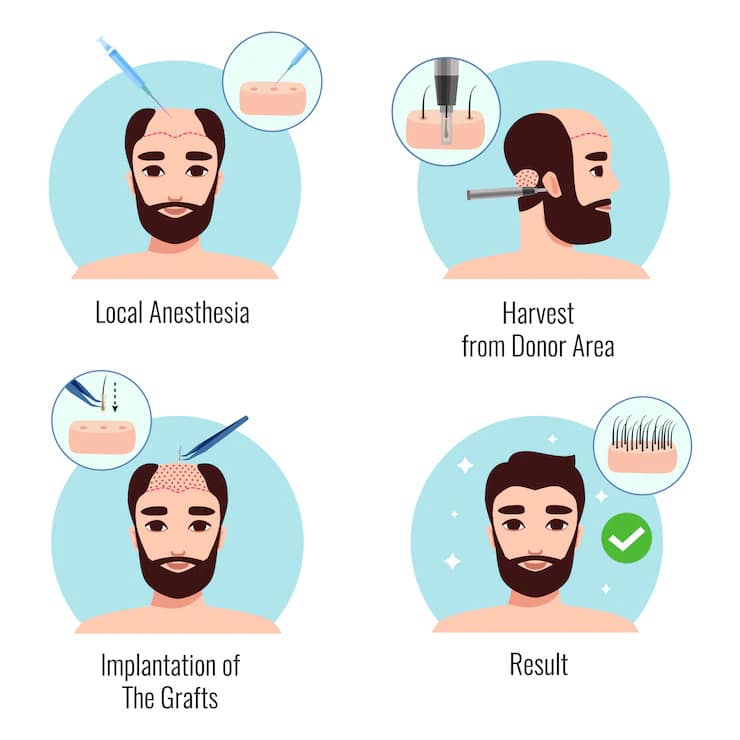Curly, wavy, straight, frizzled, oily, however your hair is, it adds to your personality. You might not know this, but your hair builds confidence in you. You realise this only when you start losing your hair.

Common Questions on Hair Transplants
Thanks to advancements in medical technology, you can get back your natural-looking hair through simple hair transplants. Read on to know the answers to questions that people have about hair transplants.
1. Why does hair loss happen?
We all normally lose 50 to 100 hairs every day. This is normal and you’re not going to notice any change in your hair density due to this. This is called hair fall.
Hair loss is basically excessive falling off of hair. In this case, hair does not grow back as quickly as you lose hair which means that a part of your scalp starts getting exposed. It happens due to hormonal changes, your genes (heredity), aging and might also be because of some medical conditions like hypertension, thyroid, cancer etc
2. How will I know if it is hair loss or hair fall?
You can observe how much hair you are losing on a daily basis when you comb your hair. If you see clumps of hair falling out and can see that your scalp is slowly getting exposed, you can consider that you are having hair loss.
There’s another simple test that you can do. It’s called the pull test. Hold some strands of hair in your hand and give them a pull as you run your hands through it. If you have less than 10 hairs in your hand, its normal hair fall but if you see more than 20 hairs coming away, you can consider it as hair loss.
3. What should I do if I feel that I have heavy hair loss?
If you’re concerned that you are experiencing heavy hair loss, you should visit a dermatologist. Many times, hair loss is just related to these:
- deficiency in iron, some vitamins, protein
- using a shampoo that does not suit your hair
- not taking care of your hair like washing, oiling and keeping it clean
Making corrections like keeping your hair clean and eating a healthier diet solves hair fall problems in many.
But when the hair loss is related to hormonal changes or heredity etc, can be controlled with hair loss treatments. Some of these have side effects. So, it’s important to get them prescribed from your doctor rather than self-medicating.
4. What are the available hair loss treatments?
After running a few tests, your doctor will suggest the right treatment for you. Some of the most common treatments are:
- Medication: Medicines in the forms of pills, shampoos, conditioners and oils are available. These help in preventing hair loss and also help in growth of hair.
- Hair transplant surgery: In cases of heavy hair loss when hair growth is slow and parts of the scalp are getting exposed, your doctor will recommend you to go for a hair transplant surgery.
5. What are the types of hair transplant?
There are two most popular types of hair transplants. They are FUT (Follicular Unit Transplantation) and FUE (Follicular Unit Extraction). Both of these involve placing hair grafts in incisions made on the scalp.
To know how the two procedures are different, study the picture given below:
6. Is hair transplant permanent?
Hair transplant surgery can be considered permanent because it is long lasting. However, it will not remain the same. As people age, hair does become thinner. You can decide to go for further treatments according to the advice of your doctor.
After the surgery, it takes your scalp some time to heal. During this time, some people also experience loss of hair. Once the healing is complete, you can judge whether you are happy with the transplant or you need to address other bald patches as well.
Remember, you don’t need to live with a thinning scalp. You can take charge and give yourself a chance to grow back your hair. There are quite a few myths that are associated with hair transplant. Please check them out in this post: (Give FB link)
If you want to know more about the treatment, please contactAyu Health at 08069489584 or visit www.ayu.health
Ayu Health can provide quality healthcare at affordable prices. Contact 636-610-0800 to book an appointment now.
Our Hospital Locations
General Surgery Hospitals in Chandigarh | General Surgery Hospitals in Bangalore | General Surgery Hospitals in Jaipur | General Surgery Hospitals in NCR | General Surgery Hospitals in Hyderabad
Our Doctors
General Surgery Doctors in Chandigarh | General Surgery Doctors in Bangalore | General Surgery Doctors in Jaipur | General Surgery Doctors in NCR | General Surgery Doctors in Hyderabad
About the Author

Dr. Rachana Shilpakar
Dr. Rachana Shilpakar is a renowned Dermatologist currently practicing at Ayu Health, Bangalore.
Dr. Rachana Shilpakar is a dermatologist with over 12 years of experience in the field. She has experience in clinical & aesthetic dermatology & she is well versed with all procedures & lasers. She is specialized surgeon in Dermatology




